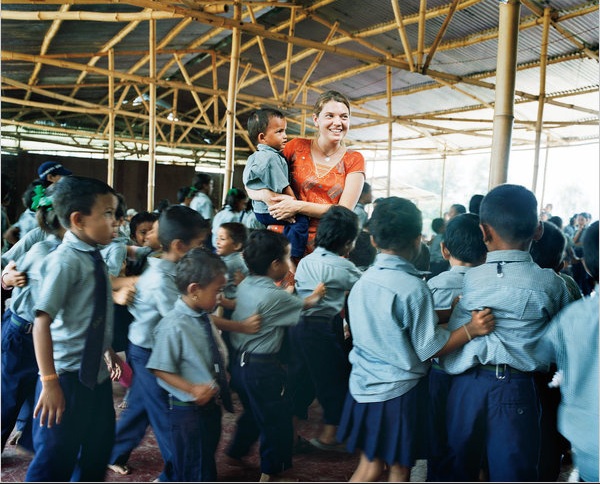The Beginning
Maggie Doyne was an average 18 year old from New Jersey when she decided to travel to South East Asia on her own with only a backpack. After traveling and witnessing the beauty in the landscape and culture, Maggie decided to take an internship position in Northeastern India, working with children. While serving there, Maggie came in contact Nepalese refugees, becoming friends with a young girl among them. Maggie and her friend, Sunita, visit Sunita’s former home in Nepal and found it in disrepair, her home taken over and her parents gone. After this first visit and more time spent in the country, Maggie fell in love with Nepal, its culture and its people. Her work in Nepal led her to be in contact with many children and orphans forced into child labor and unable to go to school. Maggie was devastated to witness the unspeakable hardships these children faced, but nevertheless asked herself
“Is there something I can do to make a difference in the life of just one child?”
Spreading the Word
After finding inquiring about the situations of these children, she discovered that what often prevented them from going to school was the tuition, uniform and book costs, which amounted to around $8-10. Maggie began by sending one girl to school, which soon turned into another 5, and the numbers continued to increase. Her work began to expand as she spent her $5,000 life savings on a piece of land, she, with the strong support of the villagers in her area, hoped to turn into a Children’s Home. Maggie returned home and began doing small fundraisers to finance the actual building of the home. Soon enough, a local newspaper printed her story, and donations began to come in. Since this first publicity, Maggie has won $20,000 from Maybelline and $100,000 from DoSomething.org toward her work. Her story has also been published by Huffington Post and the New York Times.
Today
Since these breakthroughs, Maggie has built a two story children’s home, called Kopila Valley Children’s Home, which now houses 40 children. Many of the children in the home were forced into child labor at a young age, and many more will be the first literate generation in their families. More recently, Maggie was able to build Kopila Valley Primary school, which educates over 300 students, who receive not only education, but a meal and basic medical care. If that were not enough, Maggie also keeps sustainability at the forefront of her mission, by farming and raising livestock on the land surrounding the home and constructing the school building out of bamboo. In order to continue to fund the projects, Maggie has created the BlinkNow Foundation, which funds the home, school and similar projects in the future. Maggie explains her commitment to such a difficult mission in a simple statement:
“I want to create a world that I want to see everyday” – Maggie Doyne
To find out more:
http://blinknow.org/about-maggie-doyne/
Maggie Doyne — Why the human family can do better from The Do Lectures on Vimeo.



Maggie is such an inspiration. What she is doing for those children is so great. The thing that I like most about her is how she tries to sustain herself. That doesn’t seem to be typical among a lot of missionaries. The more she can sustain, the more she can do to help with the money she receives.
Really inspirational piece on a woman with a genuine passion to serve Nepalese refugees. Conditions in most areas in Southeast Asia are less than optimal, but the circumstances for refugees rooted from their homes and forced to scrape by in a strange land are even worse. Maggie’s success in transforming all the funds she receives into sustainable development is admirable.